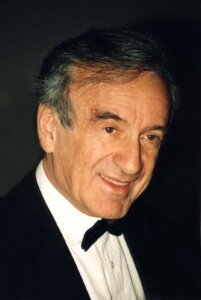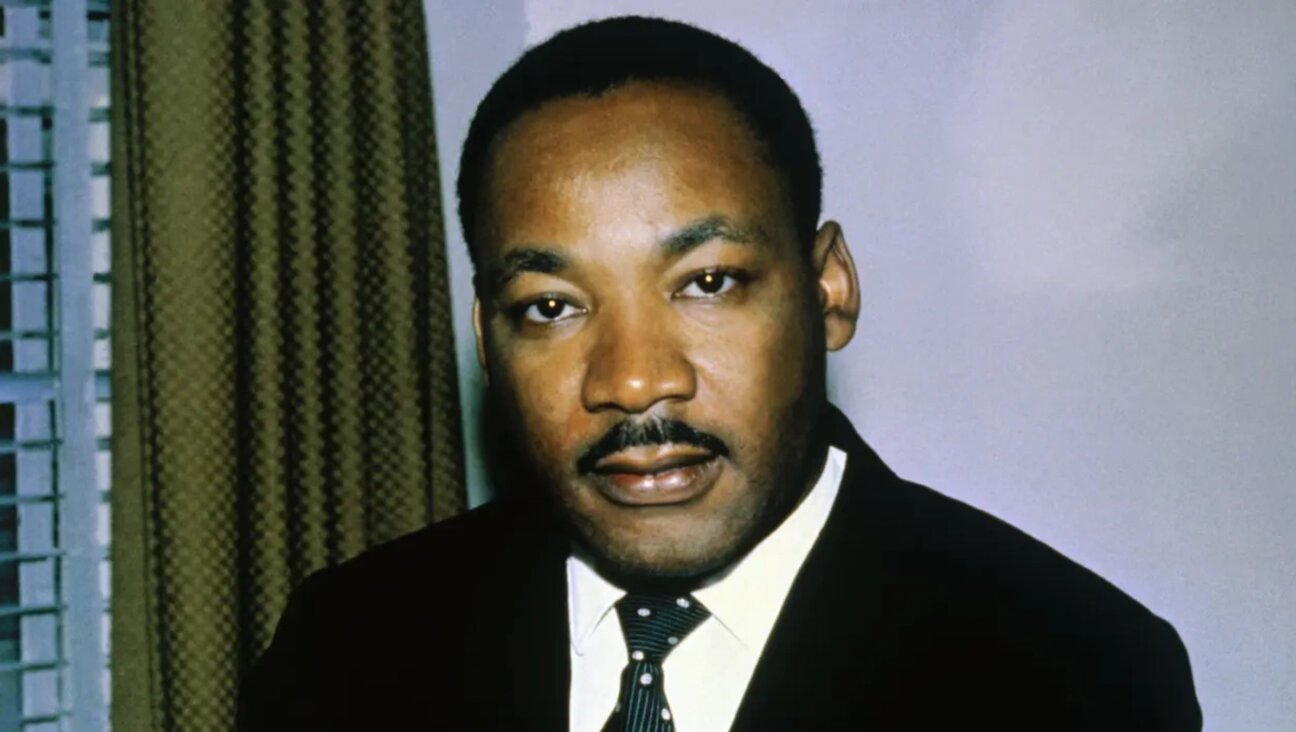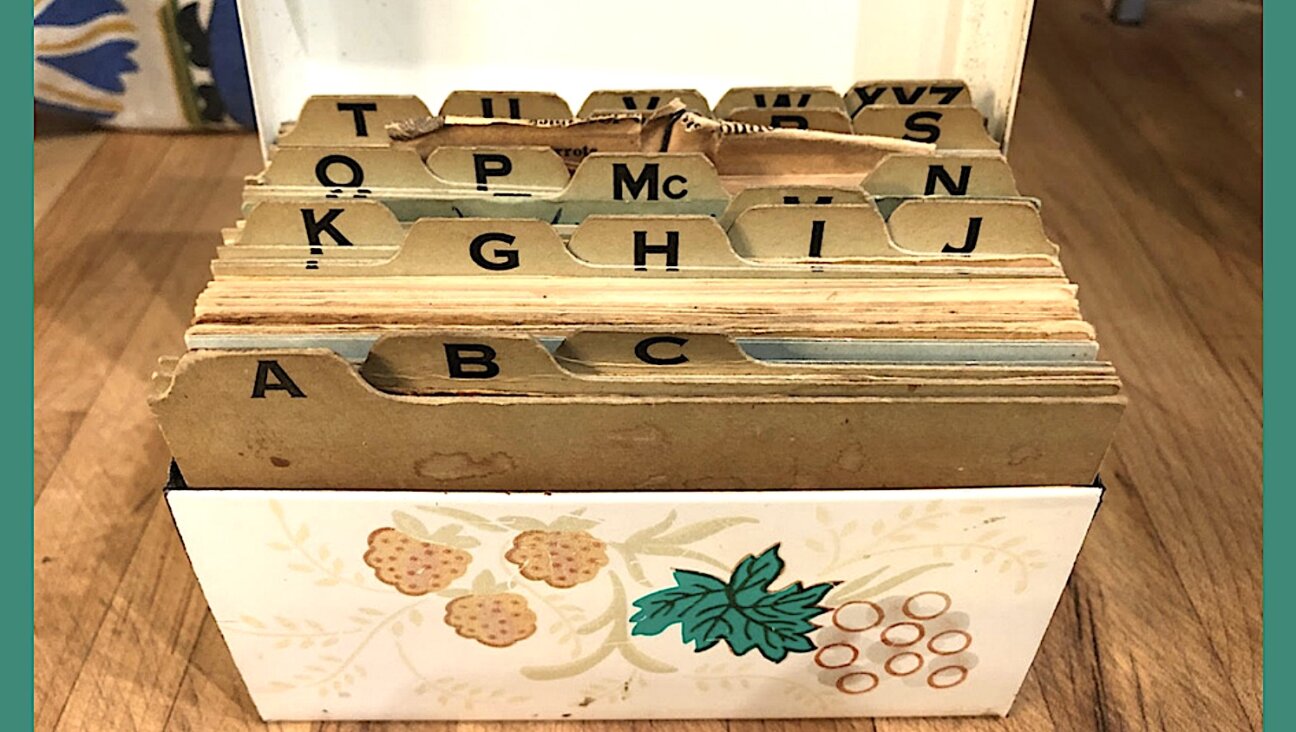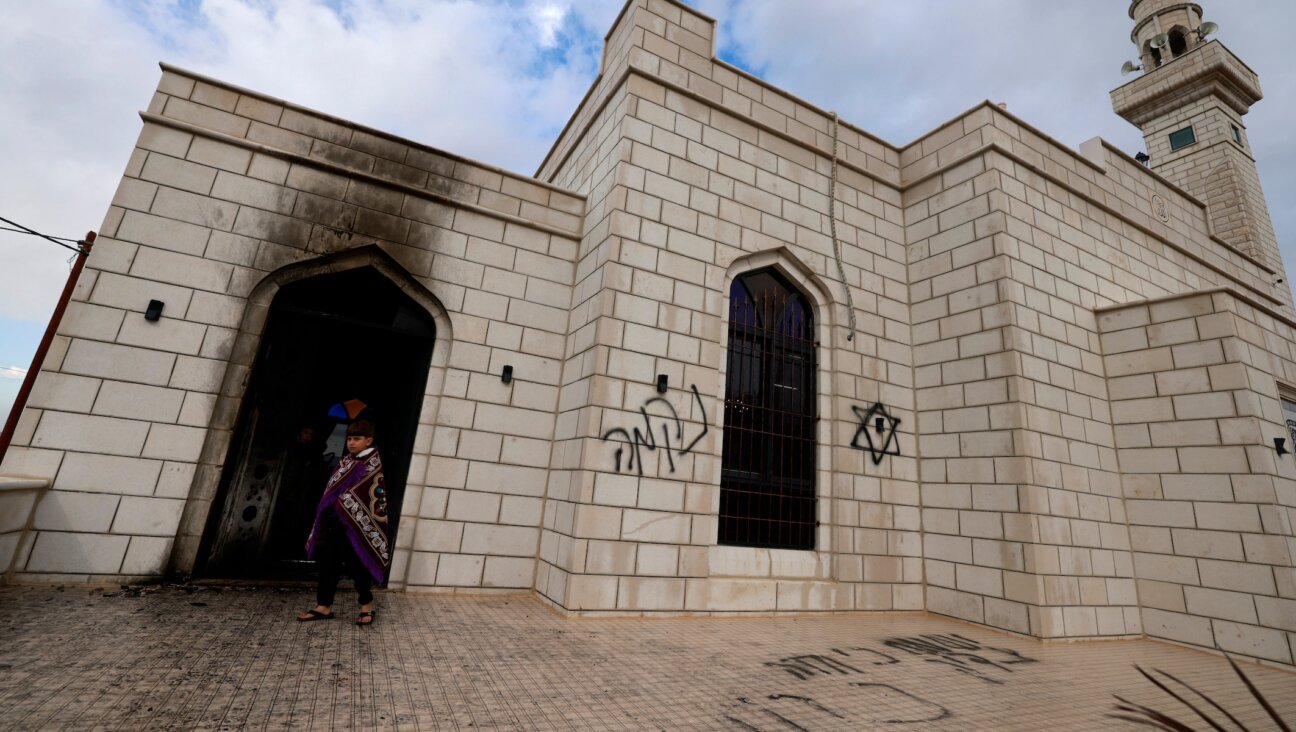When Elie Wiesel was enchanted by Disneyland
The famed writer discovered that one day we would have caller ID and home security cameras
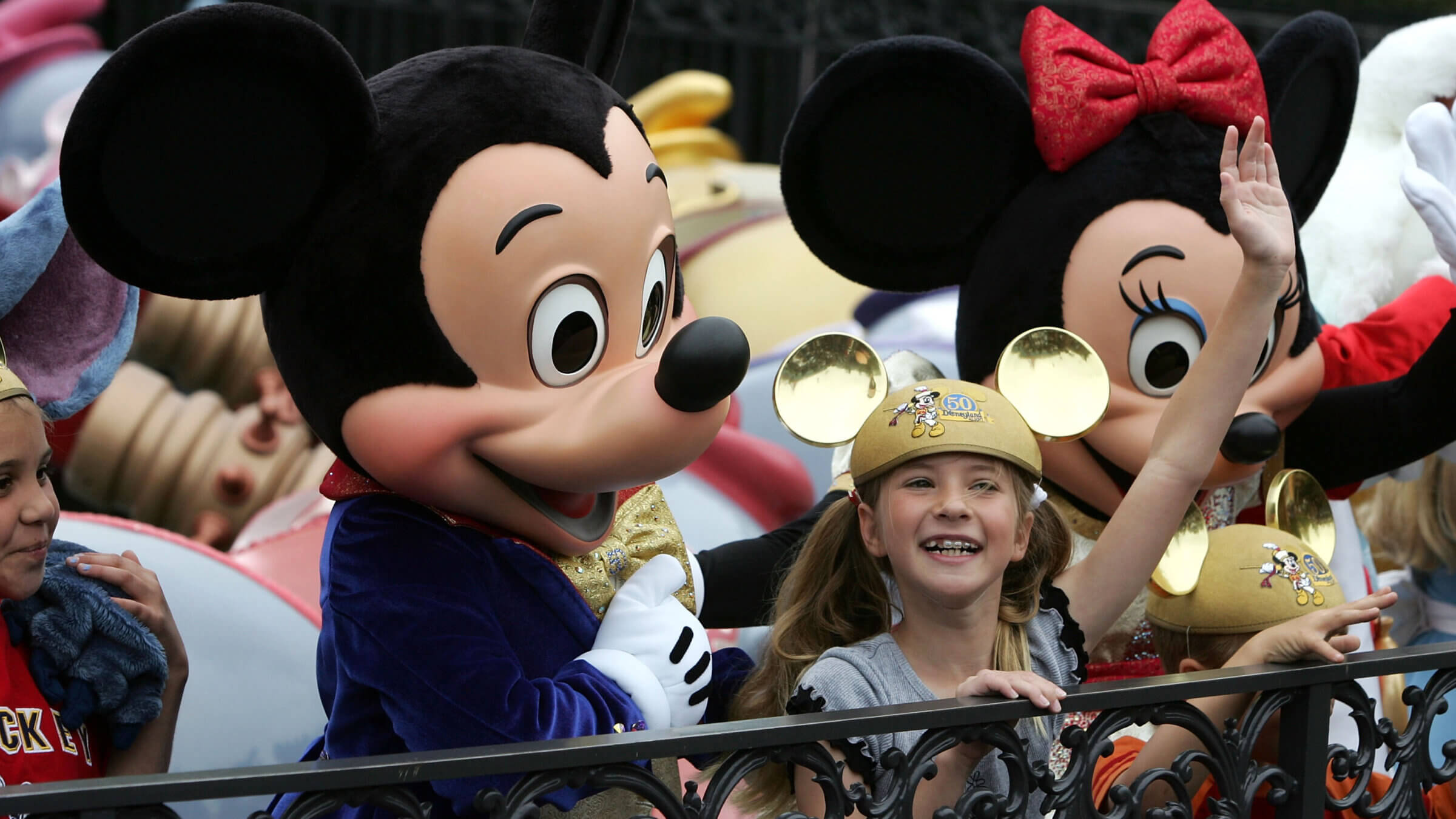
Photo by Frazer Harrison/Getty Images
Editor’s note: Elie Wiesel, the Holocaust survivor and author of Night, wrote in Yiddish for the Forverts for many years, where he serialized the books that eventually became Dawn and Day. As a correspondent, he took a trip to the West, including Disneyland.
We translated this 1957 article, as archived digitally by the National Library of Israel, as part of a deeper study of Wiesel. We are in the process of translating the interviews he did with Forverts editor Simon Weber on radio station WEVD. You can listen to an excerpt from an interview here.
Wiesel’s reports tended to be more literary and philosophical than journalistic. Though he does cite facts and figures about the amusement park, and details its attractions, they are not his primary focus. (This includes one attraction that would not be accepted in our day and age, namely “Indian villages,” that he viewed from a riverboat, which closed in 1971.) This article mostly lauds the pureness of childhood that Disneyland engenders, and positions Walt Disney himself, ignoring his antisemitism, as a positive alternative to a potentially non-existent God, whom Wiesel may have felt abandoned him during the Holocaust.
I don’t know if Heaven is real.
But I do know that there is a Paradise on Earth for children.
I know, because I visited it myself. I just came back from it; I just strolled through its gates; I just left the magic kingdom called “Disneyland.”
When I bid adieu to this kingdom, I finally understood the meaning of the French saying “Partir, c’est mourir un peu” — “Leaving is to die a little.”
Special helicopters
Disneyland is in California, 30 miles from Los Angeles.
Even though you won’t find it on an official map of California, nor on a map of America for that matter, you can be anywhere, whether it be New York or Paris, Tel Aviv or Tokyo, Berlin or Johannesburg and buy a plane ticket straight to Disneyland. If you buy a ticket, you’ll fly to Los Angeles and then be put on one of five special helicopters to Disneyland.

I have no idea whether people actually buy tickets straight to Disneyland. But when I was in Disneyland myself, I did see helicopters take off and fly away.
I didn’t come by helicopter. I simply came by car.
In fact, most visitors come by car. When I was there, three thousand cars were parked in its giant parking lot.
Later, one of the managers told me with a smile that the parking lot made up three quarters of the territory of the Magic Kingdom.
For those of us adults from New York who are used to wandering around for hours looking for a parking spot, this parking lot is Paradise on Earth.
Interesting figures
Walt Disney proclaimed the existence of Disneyland as a children’s kingdom in 1955.
It took a bit more than a year to build it. To be precise — a year and a day.
When you consider the amount of work that was done in this short time, you might start to believe that God actually could have created the world in six days…true, He didn’t have any help, but He is God after all!
Speaking of God: It’s not clear to me if we should thank Him for creating the world and humanity. What is clear to me is that all children who visit Walt Disney’s paradise will show Disney eternal gratitude for building Disneyland.
Well, let’s lower ourselves back down from God’s Heaven and come back to our little kingdom.
Around a thousand employees have a wide variety of jobs — some of them quite extraordinary — including carriage drivers, ship captains and spaceship pilots.
Among Disneyland’s special features:
- An orchestra that gives 1,460 concerts a year
- 24 restaurants, which can serve 8,000 people an hour and sell a million hotdogs a year
- Its own trains, ships, rivers, police force and fire department
It’s truly a country in its own right — a country where all its citizens are happy; a country where relationships between people, and even relationships to its animals, are compassionate. Each horse that works at Disneyland, for example, isn’t permitted to work more than four hours a day, six days a week. In many other countries, people can only dream of such conditions.
Far from worry
When entering Disneyland (a ticket is $1), a magical land appears before your eyes, a land without troubles or worries.
The first thing you’ll see is an impeccable copy of a Western city from days gone by. Colorful trams pulled by horses meander the main streets. You see old-fashioned taxis; cheerful, smiling policemen roaming the streets as if they just popped out of an old movie; and a store where they sell “revolvers,” gold pouches, gifts and cowboy hats.
The train station, called “The Last Chance,” isn’t far away. You see a dentist’s office next to it. From time to time you’ll hear a “patient’s” shriek of pain. Everything looks real, believable and normal.
The train arrives. An ear-piercing whistle shrieks. You get onboard and ride through the wilderness, through dark tunnels where stunning waterfalls surround you on all sides, and through the desert where “skeletons” and “Indians” look at you with dead eyes.
Then you disembark and take a ticket for the “Mark Twain,” a ship that travels the Mississippi River. The ship is massive, and the river mighty. On the shore you see Indian villages, and it seems like real Indians made them. The villages start moving; you see a house on fire. Make no mistake: the house is really a house, and the flames are really flames.
For the thousandth time, the thought crosses your mind: the creator of this land, this countryside, must be a genius, an extraordinary genius.
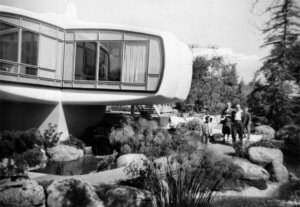
The House of the Future
When you get tired of the recent past, take a walk in the Land of the Future.
For 50 cents, you can buy a ticket to fly to the moon; for 25 cents, you can fly a jet; and if you don’t want to pay any more money, you can visit the House of the Future for free.
This four-winged house was built by various American companies, and shows how people will live 50 years from now.
Leaving Disneyland pains the heart. Too bad I was born 28 years ago and not 128 years in the future.
You will have such a good life, future man!
Everything will come to him so easily.
If someone knocks on your door, you won’t need to go see who it is. Their image will show up on your TV screen.
If the telephone rings, you’ll be able to see who it is, not just hear their voice.
There are another thousand such innovations that will transform your home into a kingly palace — and transform you into a stuffed, lazy, solitary king.
8 million visitors
Since Disneyland first opened, around 8 million people have visited the children’s kingdom. 40% of them came from 63 foreign countries.
Most visitors are, naturally, children, and adults come only as chaperones. But after a number of minutes go by, the grownups unwittingly become entranced by play and at the end, they don’t want to leave even when the children get tired. Walt Disney himself often comes to enjoy Disneyland, incognito.
I understand him: if you want to calm your nerves, if you want to forget your bitter, daily reality, there’s no better place than Disneyland.
In Disneyland — the children’s dreamland — everything is simple, beautiful and good.
There, people don’t shout at each other. People don’t exploit each other. One person’s happiness isn’t dependent on the unhappiness of others.
If children had the right to vote, they would vote for Disney as president. The whole world would be a different place.
The childhood manufacturer
I met Walt Disney in 1953, in the gorgeous city on the French Riviera, Cannes.
In Cannes, the yearly film festival was taking place, and the French government awarded Disney the highest prize, the medal of the Legion d’Honneur.
They organized a magnificent ceremony; a government minister came down from Paris and awarded Disney with the medal himself; writers, producers, film stars gave enthusiastic speeches; then, they drank champagne; the afterparty was a blast.
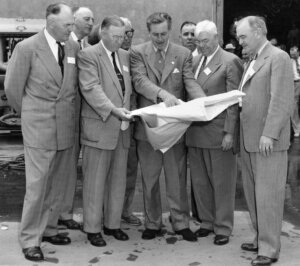
I asked Walt Disney:
“The whole world loves you; your children’s films have granted you great honor, fame, and everything a person could want from humanity, so I ask you this: What is your purpose? What do you want — what would you want — to achieve with your art?”
Disney thought for awhile, fixing his eyes on a faraway but indistinct point and answered:
“Childhood. The purpose of my creation was always to awaken the childhood of a person, a grown-up person. Because — the most beautiful part of a person is their childhood.”
It pains me to say that at that time, I didn’t understand what he meant. I understood him, but — today, after spending time at Disneyland, I understand him better.
Today, I not just visited Disneyland, but even more so, my childhood.
A message from our Publisher & CEO Rachel Fishman Feddersen

I hope you appreciated this article. Before you go, I’d like to ask you to please support the Forward’s award-winning, nonprofit journalism during this critical time.
At a time when other newsrooms are closing or cutting back, the Forward has removed its paywall and invested additional resources to report on the ground from Israel and around the U.S. on the impact of the war, rising antisemitism and polarized discourse.
Readers like you make it all possible. Support our work by becoming a Forward Member and connect with our journalism and your community.
— Rachel Fishman Feddersen, Publisher and CEO



